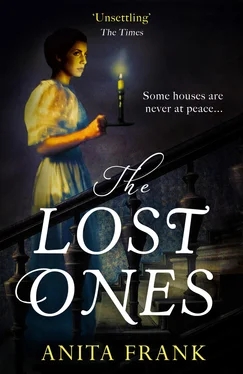I felt six inches taller as I climbed into the back seat next to my godmother. We both turned to wave out of the rear window as the car pulled away and as Aunt Irene settled back for the journey home, she made no attempt to hide her approving smile, nor her brief nod of satisfaction, as her eyes twinkled with glee.
‘Halcyon days indeed.’ I withdrew my fingers from the glass, my heart aching. Halcyon days the like of which I would never enjoy again. My throat burnt with contained tears as I bit my lip and turned away from the kingfisher, silently cursing him for his betrayal.
I was shaking by the time I slid back into my chair, battling to control the unruly sway of my emotions. I snatched up my pen, determined to divert myself with industry, and quickly dashed off a greeting to a Sister I had worked with in France. I paused, my nib resting on the paper, as I remembered how kind she had been on that awful final day. My grip tightened on the pen. I was barely aware of the force I was exerting, when the fine tip broke under the pressure.
‘Oh Stella! How careless of you!’ Madeleine chided, having heard the snap of the metal, but her tone changed in an instant as she looked up to see my mounting distress. ‘Stella? What is it?’
I shook my head, breathing deeply to suppress a deluge of tears. ‘I’m sorry … I’m being silly … lost in unhelpful thoughts.’
‘Oh Stella …’ Madeleine rested her hand on my arm.
I patted it reassuringly before clearing my throat. ‘Well, that was rather silly of me. Where might I find a new nib?’
Clearly sensing my desire to move on, Madeleine got up in pursuit of a replacement. She rifled through a set of desk drawers, and the writing box on the window sill, but without reward.
‘I do know that mother-in-law has spare nibs in her bureau in the morning room – shall I go and look for you?’ she asked.
Keen to have a moment to myself, I assured her I was happy to go. She told me where they were to be found and with a concerned smile, sent me on my way. I closed the door behind me and paused while I afforded myself time to come to terms with the past. Only when my doldrums were banished, and I felt sufficiently restored, did I set off towards the morning room, ready to face the world once again.
I knocked lightly when I reached the door. On receiving no answer, I gingerly turned the brass handle. I was most relieved to find the room unoccupied.
I had seen it only once before, little more than a cursory glance on Madeleine’s whistle-stop tour that first day. In stark contrast to the rest of Greyswick, it was a pretty room, painted a vibrant buttercup yellow, and was perfectly positioned to enjoy the sun which streamed in through the floor-to-ceiling windows now the storm had abated. Great cut-glass bowls of pot pourri embellished the other window sills, leaving the hint of a faded summer in the air. The armchairs cosily arranged around the fireplace were covered in chintz, and the shelf of the mantelpiece was draped in velvet as if from a bygone era, and it crossed my mind that the décor may have been unchanged since Lady Brightwell first took occupancy of the house.
I took a moment to examine the abundance of silver picture frames placed about the room. They contained sepia images of largely unfamiliar faces, though some bore sufficient resemblance to Lady Brightwell to suggest a familial connection. There were some pleasantly candid photographs of Hector and Madeleine, as well as the lady herself – there was even a rather charming one of Miss Scott – but I noted with some curiosity there were none of Sir Arthur. He didn’t even figure in the ensemble shots taken at house parties and Christmases past. It smacked of a purposeful omission, as if a concerted attempt had been made to erase his presence, but before I could ponder further on this apparent slight, I found myself drawn to the commanding painting that hung above the mantelpiece.
It was a stunning portrait, skilfully done, and though the years may have aged her, it was instantly recognisable as a young Lady Brightwell.
She was standing in profile at a large fireplace, the fingertips of her right hand just visible as they rested on the broad marble mantel. There was a gilt-framed mirror hanging above it, and though the suggestion was a desire to see her reflection had brought her to that spot, her face was angled away from the glass – Lady Brightwell herself was looking directly at the artist. She was dressed in an exquisite red evening gown, the sharp lines of her shoulder blades just visible above the buttoned back that clung to her torso, pulling into a minuscule waist before rucking up in elaborate folds over a bustle and tumbling in waves to pool on the floor. Her chestnut brown hair, threaded with strands of gold, had been gathered up with diamond-headed pins until it overflowed, covering her neck with a cascade of curls. But it was the expression on the stunning young face that struck me the most.
This was no whimsical pose. There was no coquettish regard for the painter, as he painstakingly preserved her for posterity. The expression on her face was arrogantly self-assured. This was a young woman confident of her looks, from the fine line of her nose, to her arched brows and sculpted cheekbones, a young woman who knew her mouth was the perfect shape even if her lips were a little too thin. She was aware her beauty was arresting, and her eyes shone with an unveiled challenge to the artist, daring him to record her otherwise.
‘She is a very beautiful woman, is she not, Miss Marcham?’
I whirled around at the intrusion. Miss Scott was standing at the open door. I hadn’t heard her enter and fumbled my apologies. She smiled as she drew near.
‘Please don’t apologise. She is very distracting.’
‘It’s a wonderful portrait.’
‘She was just eighteen when that was done. Oh! She made me do her hair four times before she was satisfied with it. She was quite determined to look perfect.’ She drank in the picture, her face rapt, as if relishing it for the first time. ‘And she did look perfect,’ she finished, her voice soft.
‘You’ve been with her for a very long time then, Miss Scott?’
‘Since she was seventeen, and I was not much older myself. She was headstrong and determined even then, and a much-toasted debutante. I’ve witnessed rooms fall silent by the mere act of her walking into them.’
I looked again at the portrait and had no doubt that the companion’s recollections were accurate.
‘She is quite a forceful character,’ I said without thinking. I saw a flicker of discomfort on the older woman’s face.
‘You mustn’t judge her too harshly, Miss Marcham. What you see above you is a carefully choreographed image. What lies beneath the surface is often too profound to be caught in oils and brush strokes. The events of a lifetime have moulded her into the woman she is today.’
The admonishment was gentle but left me feeling gauche. The affection Miss Scott felt for her employer was clearly deep-seated and genuine, however difficult that might be for me to understand – and she clearly had the patience of a saint to suffer the woman’s foibles.
We both turned when we heard a slight cough behind us. Mrs Henge stood framed by the doorway.
‘Forgive me for interrupting. I just wanted to check this morning’s tea things had been cleared.’ I was surprised to detect an uncharacteristically soft timbre to the housekeeper’s voice as she addressed us, Miss Scott her primary focus. One glance revealed the china was still very much in evidence – abandoned on a squat table. Mrs Henge’s lips pursed in displeasure and I pitied poor Maisie, who I suspected had overlooked the task amongst a multitude of other chores.
‘Oh dear, it’s a bit of a mess, isn’t it?’ Miss Scott declared without recrimination, as Mrs Henge advanced on the china. I explained then that I had come looking for a pen nib. ‘Oh, you’ll find one in the bureau, Lady Brightwell always keeps several spares, let me find one for you.’
Читать дальше











